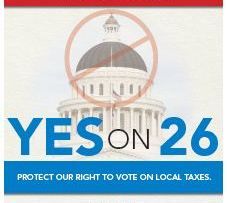Contra Costa case a template for Prop. 26 abuse

 In recent California history, small-government advocates have no more significant victory than the triumph of Proposition 26 in 2010. Here’s an explanation of its main thrust from an analysis by the League of California Cities:
In recent California history, small-government advocates have no more significant victory than the triumph of Proposition 26 in 2010. Here’s an explanation of its main thrust from an analysis by the League of California Cities:
“Prop. 26 is divided into two parts. One part addresses state fees and the other addresses local fees. Although the two parts overlap substantially, there are also significant differences. This article focuses exclusively on the part addressing local fees.
“Prop. 26 is a constitutional amendment that introduces, for the first time, a definition of what constitutes a local tax: … any levy, charge or exaction of any kind imposed by a local government …
“Therefore, almost any requirement imposed by a local government that results in the local government receiving revenues is a local tax. This means that the local government would need to obtain a majority approval of the voters if the revenues are to be used for general governmental purposes, or a two-thirds voter approval if the revenues are to be used for a particular purpose. In contrast, a fee may be adopted by a majority vote of the city council.”
The intent was to end as much as possible shenanigans in which taxes were labeled fees and passed or adopted without the level of support necessary to enact higher taxes under Prop. 13 and other state laws. But what’s going on now in Contra Costa County shows a possible way that Prop. 26 can be gamed by the government officials who lust after higher revenue by any means necessary.
Fee doubles — new mandates blamed
 This is from Contra Costa Times columnist Tom Barnidge:
This is from Contra Costa Times columnist Tom Barnidge:
“Rocco Biale got a surprise in the mail recently. The county health permit invoice for his Walnut Creek restaurant, Rocco’s Ristorante Pizzeria, was $1,813 — nearly twice as much as the year before.
“‘I wondered if it was a typographical error,’ he said. ‘I went back and looked up last year’s bill: It was $957.’
“Chris Frumenti, owner of Mangia Ristorante Pizzeria in Lafayette, got similar news, his fee jumping from $800 to $1,648. …
“The Contra Costa Environmental Health division didn’t stop at pizza joints. Zack Scott, who owns Walnut Creek eatery Havana, said his fees also doubled.”
How is this possible in the post-Prop. 26 era? Because of this exception written into the law, as cited by the League of California Cities:
“The Licenses and Permits Exception provides that the following are not taxes: a fee imposed for issuing licenses and permits; and the costs of administrative enforcement of licenses and permits. Common examples include health and safety permits, building licenses, police background checks and permits for regulated businesses (such as massage establishments, card rooms, taxicabs and tow-truck operators). … the fee imposed must not exceed the city’s reasonable costs. If the fee does exceed the reasonable costs, then it is not eligible for any of these exceptions and would be a tax subject to voter approval.”
Play for revenue disguised as bureaucratic requirement
Back to what’s going on in Contra Costa:
“It turns out there’s a rational explanation — an explanation, anyway — for why Environmental Health Director Marilyn Underwood asked the board to increase fees.
“Since taking her post three years ago, one of her directives has been to get the department’s books in order — it previously operated at an annual deficit of some $750,000. She also must comply with the U.S. Food and Drug Administration’s recently updated food code calling for more thorough inspections. According to provisions of California’s Proposition 26, her agency can charge fees equal to the reasonable cost of enforcement administration.”
What a scam. If you really think the cost of food inspections to Contra Costa County more than doubled, I’ve got a subdivision in Lake Elsinore you might be interested in. This was a revenue play — not a considered and principled use of a Prop. 26 exception.
If anyone doesn’t think that that lots of government agencies will try to use this approach to get around Prop. 26, they haven’t been watching how California politicians act when it comes to other folks’ money.
The Contra Costa case is a harbinger of what’s to come.
Related Articles
CA bill aims at home guns
Proposed gun control legislation often appeals to a sense of public fear. Playing on worries about lone nuts and random
New CalWatchdog Radio Show
Steven Greenhut: Stay tuned to 870 am KRLA in Los Angeles every Saturday night at 11 pm for the Martha
Tax index: CA by far most taxed state
The Small Business and Entrepreneurship Council just came out with its annual report, “Small Business Tax Index 2014.” California ranked




